Friendship-Grammar and language points学案
高一必修一英语知识点u1

高一必修一英语知识点u1Unit 1: FriendshipIntroduction:In this unit, we will delve into various aspects of friendship and learn important English language skills related to this theme. We will explore vocabulary, grammar, reading, writing, and listening activities to enhance our understanding and communication abilities in English. Let's embark on this enriching journey together!1. Vocabulary:Vocabulary plays a crucial role in effective communication. In this unit, we will encounter words and phrases related to friendship. It is essential to grasp the meaning, pronunciation, and usage of these terms. Practice using new vocabulary in different contexts to expand your linguistic repertoire.2. Grammar:In Unit 1, we will focus on verb tenses, particularly the simple present and present continuous. Understanding the appropriate times to use each tense will enable us to express ideas about friendship accurately. Practice constructing sentences and asking questions using these tenses to strengthen your grammatical skills.3. Reading:Through various reading materials, such as articles, stories, and poems, we will explore different perspectives on friendship. Reading comprehension exercises will enhance our understanding of the texts and help developcritical thinking skills. Pay attention to details, make inferences, and summarize key points to improve your reading abilities.4. Writing:Effective writing skills are fundamental for expressing thoughts and ideas about friendship. In this unit, we will work on descriptive writing, focusing on describing a friend or an important friendship experience. Proper sentence structure, coherent paragraphs, and vivid language will make your writing engaging and compelling.5. Listening:Listening comprehension is crucial in any language learning process. In Unit 1, we will listen to dialogues, interviews, and lectures related to friendship. Listening exercises will enhance our ability to understand spoken English, identify main ideas, and extract specific information. Pay attention to different accents, intonation, and contextual clues to improve your listening skills.6. Speaking:Developing oral communication skills is essential for effective interaction with friends and peers. Engage in speaking activities that promote discussions about friendship, sharing personal experiences, and expressing opinions. Focus on fluency, pronunciation, and using appropriate vocabulary and grammar to build confidence in spoken English.Conclusion:Unit 1 provides a comprehensive study of friendship-related topics and equips us with the necessary language skills to navigate English communication successfully. Through vocabulary, grammar, reading, writing, listening, and speaking activities, we will enhance our overall English proficiency. Embrace the learning process, actively participate in class, and enjoy the journey towards fluency and understanding in English. Let's foster meaningful connections through the power of language and friendship!。
Unit 1 Friendship grammar
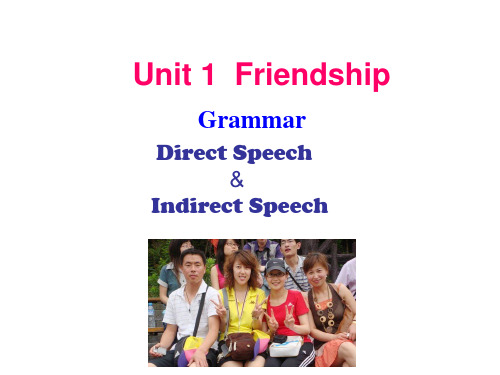
Grammar
Direct Speech &
Indirect Speech
lead-in
I am a student.
She said, “I am a student.”
She said (that) she was a student.
Direct Speech (直接引语)
My friend told me that he had two partner in his team.
1、人称的变化一随主,二随宾,第三人称不更新
口
说明
直接引语
诀
间接引语
一
引号内的第一人 称变间引后与主
随 句主语的人称保
主 持一致
She said,“ I like playing tennis.”
1. will would 2. don’t not to 3. was his home his home was 4. bought had bought 5. not not to
直接引语 一般现在时 现在进行时 一般过去时 现在完成时 一般将来时
间接引语 一般过去时 过去进行时 过去完成时 过去完成时 过去将来时
我大
我围着你转
The teacher told “The earth moves us that the earth around the sun.” moves around the
第一 人称
He said, “I haven't heard from my parents these days.”
He said that he hadn't heard from his parents those days.
unit1 friendship language points语言点

Language points
Difficult 1. I wonder if it’s because I haven’t been able Sentences to be outdoors for so long that I’ve grown so
-------------
He got up very early in order to catch the first bus. =He got up very early so as to catch the first bus. =He got up very early in order that he could catch the first bus.
Practice
1、There was ______ time ____ I loved to play
the comeputer game ―Plants vs Zombies‖.
A. a; that B. a; when
C. the; that D. the; when 2、——Excuse me? Could you tell me how to get to
(2)、dare 也可用作情态动词,意为 “敢” dare do sth. 敢于做…
Words and expressions eg: 1、我不敢和她一起遛狗。
I don’t dare to walk the dog with her. I daren’t walk the dog with her. 2、你敢和她一起遛狗吗? Do you dare to walk the dog with her? Dare you walk the dog with her?
高一英语good friends- language points,grammar

Direct Speech and Indirect Speech
• They said, “We are going to see him now.” • She said, “I will go tomorrow.” • He said to me, “I do it yesterday.” • He said to me, “I came back an hour ago.” • They said that they were going to see him then. • She said that she would go tomorrow/the next day. • He told me that did it yesterday/the day before. • He said to me that he had come back an hour before.
Direct Speech and Indirect Speech
• She says, “He is very kind.” • She says, “He was very kind.” • He said, “It is true.” • He said, “It was true.”
• “Two and two makes four,” said he.
survive v. • Her parents died in the accident, but she survived. • He survived in the desert for a week on biscuits and water. • Only one baby survived the terrible earthquake.
Unit1-Friendship-Language-points

happened. 4. He _s_et__a_b_o_u_t learning Chinese at the
强调时间状语
_I_t _w_a_s_y_e_s_t_er_d_a_y__a_ft_e_r_n_o_o_n_
_th__at__ Jack broke a glass at his uncle’s home.
强调地点状语
_I_t_w_a_s__a_t _h_is__u_n_c_le_’_s_h_o_m__e_
_th__at__ Jack broke a glass yesterday afternoon.
第16页,共16页。
on purpose 故意的
e.g. I know you didn’t break the vase on
purpose. Don’t cry! 我知道你不是故意把花瓶打破的。 别哭了。
第11页,共16页。
5. …it was the first time in a year and a half
With time ____g_o_i_n_g,bCyhina is not what it used to be thirty years ago. 3. Don’t
_________g_oyaoguarinpsatrents. ______ to the next item.
go on
4. Let us
第1页,共16页。
1. Add up your score and see how many points you
新人教版必修一Unit1FriendshipGrammar优秀教案word精品文档7页
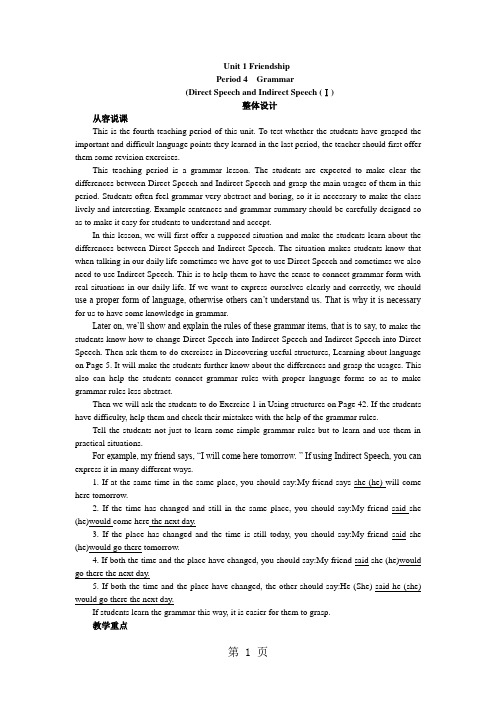
Unit 1 FriendshipPeriod 4Grammar(Direct Speech and Indirect Speech (Ⅰ)整体设计从容说课This is the fourth teaching period of this unit. To test whether the students have grasped the important and difficult language points they learned in the last period, the teacher should first offer them some revision exercises.This teaching period is a grammar lesson. The students are expected to make clear the differences between Direct Speech and Indirect Speech and grasp the main usages of them in this period. Students often feel grammar very abstract and boring, so it is necessary to make the class lively and interesting. Example sentences and grammar summary should be carefully designed so as to make it easy for students to understand and accept.In this lesson, we will first offer a supposed situation and make the students learn about the differences between Direct Speech and Indirect Speech. The situation makes students know that when talking in our daily life sometimes we have got to use Direct Speech and sometimes we also need to use Indirect Speech. This is to help them to have the sense to connect grammar form with real situations in our daily life. If we want to express ourselves clearly and correctly, we should use a proper form of language, otherwise others can’t understand us. That is why it is necessary for us to have some knowledge in grammar.Later on, we’ll show and explain the rules of these grammar items, that is to say, to make the students know how to change Direct Speech into Indirect Speech and Indirect Speech into Direct Speech. Then ask them to do exercises in Discovering useful structures, Learning about language on Page 5. It will make the students further know about the differences and grasp the usages. This also can help the students connect grammar rules with proper language forms so as to make grammar rules less abstract.Then we will ask the students to do Exercise 1 in Using structures on Page 42. If the students have difficulty, help them and check their mistakes with the help of the grammar rules.Tell the students not just to learn some simple grammar rules but to learn and use them in practical situations.For example, my friend says, “I will come here tomorrow. ” If using Indirect Speech, you can express it in many different ways.1. If at the same time in the same place, you should say:My friend says she (he) will come here tomorrow.2. If the time has changed and still in the same place, you should say:My friend said she (he)would come here the next day.3. If the place has changed and the time is still today, you should say:My friend said she (he)would go there tomorrow.4. If both the time and the place have changed, you should say:My friend said she (he)would go there the next day.5. If both the time and the place have changed, the other should say:He (She) said he (she) would go there the next day.If students learn the grammar this way, it is easier for them to grasp.教学重点Summarize the rules of Direct Speech and Indirect Speech.教学难点Get the students to learn about the special cases in which the tenses shouldn’t be changed.教学方法Discussing, summarizing and practicing教具准备A projector and other necessary teaching tools三维目标Knowledge aims:Get the students to learn and grasp the rules of Direct Speech and Indirect Speech.Ability aims:Get the students to be able to use the rules to express their meanings and retail others’ correctly.Emotional aims:1. Get the students not to be afraid of grammar learning.2. Get the students to develop their sense of group cooperation.教学过程→Step 1 Revision1. Check the homework exercises.2. Have a dictation to write some important words and expressions.Suggested words and expressions:upset ignore concern loose cheat reason share nature thunder entirely go through hide away calm down set down grow crazy about on purpose face to face according to3. Translate some sentences using the patterns we have learned.Suggested sentences:1)为了上课不迟到,他七点钟就出发了。
高中英语Friendship-Grammar and language points学案教案

Friendship-Grammar and language points学案直接引语和间接引语(Ⅰ)1.He said,“I’m going to see a film this afternoon.”→2.He said that he was going to see a film that afternoon.3.Jack said to me,“I have waited for you for a long time.”→4.Jack told me that he had waited for me for a long time.5.The teacher said to us,“We will have an English party next week.”→6.The teacher told us that we would have an English party the next week.当我们用引引出别人的原话时,被引用部分称为直接引语,如上面的1、3、5中都用了直接引语。
当我们间接地把别人的意思转述出来时,被转述的部分称为间接引语,如上面的2、4、6中都用了间接引语。
由以上例句可以体会出,直接引语变为间接引语时,人称、时态、指示代词、时间状语、地点状语和动词都会发生变化,现总结如下:1.【提醒】下列情况下,直接引语变间接引语时时态不变。
(1)直接引语如果陈述的是客观事实或真理,当其变为间接引语时,不管主句用什么时态,间接引语的时态都不变。
The teacher told the students,“The earth goes around the sun.”→The teacher told the students that the earth goes around the sun.(2)直接引语中有明确的表示过去时间的状语时,变间接引语时,其时态仍保持过去时。
Friendship Language points--优质获奖精品教案 (9)
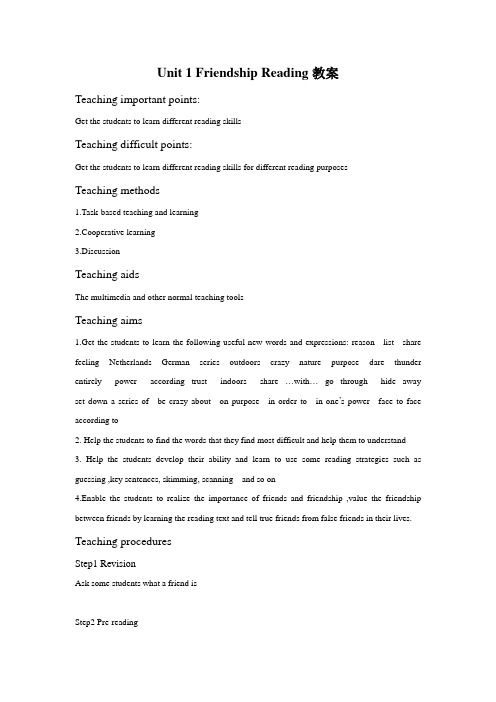
Unit 1 Friendship Reading教案Teaching important points:Get the students to learn different reading skillsTeaching difficult points:Get the students to learn different reading skills for different reading purposesTeaching methods1.Task-based teaching and learning2.Cooperative learning3.DiscussionTeaching aidsThe multimedia and other normal teaching toolsTeaching aims1.Get the students to learn the following useful new words and expressions: reason list share feeling Netherlands German series outdoors crazy nature purpose dare thunder entirely power according trust indoors share …with…go through hide away set down a series of be crazy about on purpose in order to in one’s power face to face according to2. Help the students to find the words that they find most difficult and help them to understand3. Help the students develop their ability and learn to use some reading strategies such as guessing ,key sentences, skimming, scanning and so on4.Enable the students to realize the importance of friends and friendship ,value the friendship between friends by learning the reading text and tell true friends from false friends in their lives. Teaching proceduresStep1 RevisionAsk some students what a friend isStep2 Pre-readingAsk the students the following questions so as to begin to focus students’ attentions on the main topic of the reading passage1.Why do you need friends? Make a list of reasons why friends are important to you .2.What do you think a good friend should be like? List the qualities a good friend should have.3.Does a friend always have to be a person What else can be your friend?4.Have you ever considered making friends with animals ,plants or even an object? Why or whynot?(The teacher can also tell students some background before starting to read .This is a true story. It took place in Amsterdam, Holland in the early 1940s after German Nazis had occupied most of Europe. They killed many Jews. To avoid being killed ,some Jewish families went into hiding places,often with the help of non-Jewish friends. This is what Anne’s family did.)Step3 Reading1.Get the students to try to guess what Anne’s friend was and what the passage is about by reading the title and having a quick look at the pictures in this passage without reading it.2. Get the students to skim the first two paragraphs to confirm their guessing.3. Have the class read the passage silently and then ask them to answer the following questions.1).What was Anne’s best friend? Why did she make friends with it?2) Did she have any other true friends then? Why?3) What is the difference between Anne’s diary and those of most people?4) Do you keep a diary? What do you think most people set down in their diaries?We going to read one of Anne’s diaries, but before reading, can you tell me what the diary is about with the help of one key sentence in the second paragraph?4. Reading Anne’s diary1)While reading , guess the meanings of “spellbound”, “hold me entirely in their power” fromthe discourse.2)After reading , ask the students how Anne felt in the hiding place and get them to give the twoexamples to show her feelings then.3)Choose the best answers according to the diary.(1)Anne made friends with her diary because ------------A.She didn’t like her other friendsB. She was a shy girlB.She trusted nobody D. She didn’t have a chance to communicate with her friends(2) From the diary we can infer that--------------A. Anne was a girl who loves nature B Anne was good at writing diariesC. Anne was longing for a normal life and she especially missed going outside and enjoying natureD. Anne had good observation in her daily life(3)Why did Anne and her family have to hide?A. Because they were not Germans.B. Because they were asked to do so.C. Because they did something bad.D. Because they were Jewish.(4)What is the author’s attitude towards Anne in this passage?A. Angry.B. HappyC. SorryD. Disappointed(5)What is Anne’s tone from her diary?A. Her interest in nature.B. She had no friends.C She couldn’t get outdoors for a long time. D. She could do nothing but watch nature Suggested answers: 1-D 2-C 3-D 4-C 5-A4)Ask the students to read the diary again and try to retell it. The retelling must include theinformation required below;Anne in world warII how to enjoy herself?-what?—why?Sample retelling:The diary by Anne ,a Jewish girl, gave a glimpse of her life during her family’s shelters in Amsterdam from the German Nazis’ killing in the Second World War .She treated the diary as her best friend, and in it she revealed her longing for a normal life and close contact with nature ,which helped her get through the days.Step3 Reading aloudPlay the tape of the passage for the students to listen and follow .Make sure the students phraselong sentences correctly by pausing at suitable places.Anne’s Best FriendStep4 Post-reading1.Get the students to do the exercises in the part Comprehending.2.This part helps students further understand the text by doing multiple choices, questions andanswers, and matching.3.Group workThink about and work in groups to discuss the following questions1) What would you do if your family were going to be killed just because they did something the Emperor did not like?2) When would you plan to hide ?3) How would you arrange to get food given to you every day?4) What would you do to pass the time/Step5 Consolidation1. Books shut .Get the students to tell something about Anne.(From the story, we can see that a war is cruel. Wars can bring us lots of trouble and disasters. These disasters are human , not natural. We should love peace and get rid of wars. We should create a world full of peace andharmony.2. Books Open. Get the students to discover useful words and expressions from the part Reading to complete the following sentencesShow the exercises on the screen or give out exercise papers.1)She has grown ---------about computer games.2)Was it an accident or did David do it on----------?3)From the beginning, Paul made it clear that he would be---------- (完全地)in control.4)He used to work ------even in the middle of winter.5)---- get her boyfriend to find her, she -------for many years.6)----------what he said, we can draw a conclusion that he just told----------white lies7)Born in a poor family, the president--------lots of hardships in his childhood.8) A diary is often kept to -----what happens in people’s daily lives.9)When they met with each other on a quiet evening at the end of the street, they saidnothing-----.First get the students to do the exercises. Then the answers are given. The teacher can give them explanations where necessary.Suggested answers:1)crazy 2)purpose 3)entirely 4)outdoors 5)in order not to, hid away6) According to , a series of 7) went through 8)set down 9) face to faceStep7 Homework1. Read the passage again and try to retell it.2. Finish off the related Workbook exercises.3. Write one or two sentences to express your understanding of friends and friendship。
人教版必修一Unit 1 Friendship language points教案
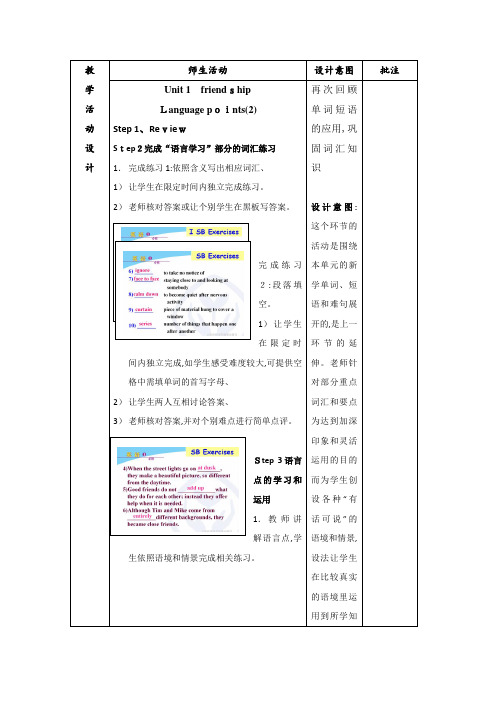
要练说,得练看。看与说是统一的,看不准就难以说得好、练看,就是训练幼儿的观察能力,扩大幼儿的认知范围,让幼儿在观察事物、观察生活、观察自然的活动中,积累词汇、理解词义、发展语言。在运用观察法组织活动时,我着眼观察于观察对象的选择,着力于观察过程的指导,着重于幼儿观察能力和语言表达能力的提高。
3。看图写话。呈现Lucy的图片,提供词汇upset, beconcernedabout, suffer from…,calm down等,让学生创设情景,编写一段话。
Step4小结和作业
1、教师借助板书小结本节所学的要点和句型,让学生口头归纳,举例。
2。作业:结合课堂讲解和课后练习复习本课时学习的重、难点词汇。
再次回顾单词短语的应用,巩固词汇知识
唐宋或更早之前,针对“经学”“律学”“算学”和“书学”各科目,其相应传授者称为“博士”,这与当今“博士”含义差不多相去甚远。而对那些特别讲授“武事"或讲解“经籍”者,又称“讲师”、“教授"和“助教”均原为学官称谓。前者始于宋,乃“宗学”“律学"“医学”“武学”等科目的讲授者;而后者则于西晋武帝时代即已设立了,主要协助国子、博士培养生徒。“助教”在古代不仅要作入流的学问,其教书育人的职责也十分明晰。唐代国子学、太学等所设之“助教”一席,也是当朝打眼的学官。至明清两代,只设国子监(国子学)一科的“助教",其身价不谓显赫,也称得上朝廷要员。至此,不管是“博士”“讲师”,依然“教授”“助教",其今日教师应具有的基本概念都具有了。
friendship-Language points

on purpose; no longer; hide away; set down; in order to; face to face 4. Why dare you not speak to Harry face to face ______________? set down 5. You needn’t __________ everything that the teacher says in class. In order to 6. ____________ earn enough money, he often works late into the night.
Language points
1. add up
加起来 Add your scores up and we’ll see who won.
把你的得分加起来,我们就知道谁赢了。
add up to 加起来总计 这些数目合计为100。
These numbers add up to 100.
add up; add up to; add to 1. The time I spend in commuting every day _________ two and a half hours. adds up to 2. Colorful balloons can add to the festival _____ atmosphere. 3. To make sure the result was correct, she ________ the figures again and again. added up
3. 昨晚他直到11点才上床睡觉。 (not...until...) He didn’t go to bed until 11 o’clock last night. 4. 当在街上散步时,他碰见了他的老 朋友汤姆。(while doing...) While walking in the street, he met his old friend Tom.
Friendship-language points-优质获奖精品课件 (24)

for 来替换。
--Why didn’t you phone me last night?
--It’s because I didn’t want to disturb you.
4) grow/be crazy about … 热衷于……; 迷恋…… The boy is crazy about skating. be crazy to do sth.
express feelings 表达感情
hurt sb's feelings 伤了某人的感情 hide /mask one's feelings 隐瞒感情 You should learn to express your feelings properly.
2.afraid adj 畏惧的,害怕的,很胆小的,非常胆 怯的 be afraid of sb/sth 害怕....... be afraid to do sth 不敢做某事
2) it’s because I haven’t been able to be outdoors
for so long that是强调句。
强调句的构成: It is/was +被强调部分 + that/who
(被强调部分是人时, 可用who替代that) …
It was in the club that I came across them two days ago. It was two days ago that I came across them in the club.
5) do with 1)与……有关
Her job is to do with computers. 2)处理, 对付 The man is difficult to do with. have something to do with 与……有些关系
Friendship Grammar--优质获奖精品教案 (1)
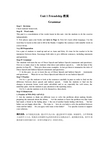
Unit 1 Friendship教案GrammarStep I RevisionCheck students' homework.Step II Word studyThis part is a consolidation of the words learnt in this unit. Ask the students to do the exercise independently.T: Now please open your books and turn to Page 4. First let's learn about language. Use the word they've learnt in this unit to fill in the blanks. Complete the sentences with suitable words in correct forms.Step III PreparationGet a pair of students to stand up and act as Anne and Kitty. It's time for the teacher to be the interpreter between them. Encourage both sides to give different sentences, including statements and questions.Step IV GrammarThe students will learn the use of Direct Speech and Indirect Speech (statements and questions). First try to make clear to the students what direct and indirect speech is, with the help of the practice in Step III. Then give them some examples. At last get them to summarize the rules of Direct Speech and Indirect Speech (statements and questions).T: In this part, we are to learn the use of Direct Speech and Indirect Speech (statements and questions). When do we use Direct Speech and when do we use Indirect Speech?Step V PracticeFor Ex 1, get the students to look at the sentences carefully in pairs in order to find out the difference between direct speech and indirect speech. Guide the students to find out the changes in pronoun forms, word order, adverbials and so on, especially the verb tenses, the underline parts. Ask the students to pay attention to the reporting clause.For Ex 2, ask the students to do it by themselves, then check.Step VI Homework1. Practice of WB (P42.1 &P 43.2)2. Ask the students to think out different ways to solve the problems about making friends, preparing the materials about the debate. Get the students to know the problem was that Anne had made a friend in the hiding place 1 the son of another family hiding with them, but her father was not happy about this. The topic is: how do you help to solve the problem between Anne and her father. Do you agree with Anne or her father? Use specific reasons to support your solutions.课后反思:本节课是语法课,能以学生为主体,通过指导学生观察、体验探究、合作等积极主动的学习方式,发现语言的规律并运用到各种语言实践活动中。
- 1、下载文档前请自行甄别文档内容的完整性,平台不提供额外的编辑、内容补充、找答案等附加服务。
- 2、"仅部分预览"的文档,不可在线预览部分如存在完整性等问题,可反馈申请退款(可完整预览的文档不适用该条件!)。
- 3、如文档侵犯您的权益,请联系客服反馈,我们会尽快为您处理(人工客服工作时间:9:00-18:30)。
Friendship-Grammar and language points学案直接引语和间接引语(Ⅰ)1.He said,“I’m going to see a film this afternoon.”→2.He said that he was going to see a film that afternoon.3.Jack said to me,“I have waited for you for a long time.”→4.Jack told me that he had waited for me for a long time.5.The teacher said to us,“We will have an English party next week.”→6.The teacher told us that we would have an English party the next week.当我们用引号引出别人的原话时,被引用部分称为直接引语,如上面的1、3、5中都用了直接引语。
当我们间接地把别人的意思转述出来时,被转述的部分称为间接引语,如上面的2、4、6中都用了间接引语。
由以上例句可以体会出,直接引语变为间接引语时,人称、时态、指示代词、时间状语、地点状语和动词都会发生变化,现总结如下:1.【提醒】下列情况下,直接引语变间接引语时时态不变。
(1)直接引语如果陈述的是客观事实或真理,当其变为间接引语时,不管主句用什么时态,间接引语的时态都不变。
The teacher told the students,“The earth goes around the sun.”→The teacher told the students that the earth goes around the sun.(2)直接引语中有明确的表示过去时间的状语时,变间接引语时,其时态仍保持过去时。
The girl said,“I was born in Hong Kong in 1990.”→The girl said that she was born in Hong Kong in 1990.(3)主句的谓语动词是一般现在时或将来时,变间接引语时,时态通常不变。
The old gentleman often says,“Time is life.”→The old gentleman often says that time is life.2.3.人称代词的变化(1)“一随主”。
若直接引语中有第一人称,变间接引语时应与主句中主语的人称相一致。
(2)“二随宾”。
若直接引语中有第二人称,变间接引语时应与主句中宾语的人称相一致。
(3)“第三人称不更新”。
直接引语中的第三人称变间接引语时不需要变化。
4.疑问句直接引语变间接引语(1)直接引语为一般疑问句,变成间接引语时,常用if或whether引导,引述动词用asked,没有间接宾语的可以加一个间接宾语me,him 等。
He asked me,“Are you good at English?”→He asked me if/whether I was good at English.(2)反意疑问句变间接引语时,只能用whether来引导。
(3)特殊疑问句变间接引语时,用原句中的疑问词作连词,将句子改为陈述语序。
The teacher asked the boy,“Why are you late again?”→The teacher asked the boy why he was late again.I asked her,“When did you come here?”→I asked her when she had been there.5.直接引语变间接引语时,还要注意几种特殊情况:(1)陈述句由直接引语变为间接引语时,如果有两个或两个以上的宾语从句并列时,仅能省略第一个that,其余的均不可省略。
He said,“I want to visit the Great Wall,and my father will go with me then.”→He said (that) he wanted to visit the Great Wall and that his father would go with him then. (2)直接引语是祈使句时,变间接引语时常变为ask/tell/order sb.to do sth.句型。
如果是以let’s开头的祈使句,则通常变为suggest doing 或suggest+that 从句。
“Do it again.”the teacher said to us.→The teacher told us to do it again.(3)直接引语中有when,since,while引导的从句,在变为间接引语时,只改变主句的时态,从句的时态不变。
(4)如果在当地转述,here不必变为there,come不必变为go;如果在当天转述,则today,yesterday,tomorrow等时间状语也不必变化。
(5)有的疑问句并非提出疑问,而是表示请求、建议、劝告等意义。
引述这类疑问句时,通常用“ask/advise/want+宾语+不定式”的结构,表示建议时,通常用“suggest+动名词”等结构。
Mr.Green asked,“Shall we go to Beijing to watch the Olympic Games?”→Mr.Green suggested going to Beijing to watch the Olympic Games.Ⅰ.句型转换1.He said to me,“I broke your CD player yesterday.”He told me that he had broken my CD player the day before.2.He said to me,“What can I do for you?”He asked me what he could do for me.3.He said,“I haven’t seen these children by now.”He said that he hadn’t seen those children by then.4.He asked me,“Can I go to see her tomorrow?”He asked me if he could go to see her the next day.Ⅱ.把下列直接引语变为间接引语或间接引语变为直接引语1.“We’ve lived there for two years,”he told me.He told me that they had lived there for two years.2.“I was here a few weeks ago,”she said.She said she had been there a few weeks before.3.“I went to university in the 1960s,”Wang Hua told his students.Wang Hua told his students that she/he went to university in the 1960s.4.The teacher asked Wang Ying why she hadn’t gone to school the day before.“Why didn’t you go to school yesterday?”the teacher asked Wang Ying.Language Points1.I am having some trouble with my classmates at the moment.目前我和我的同学有矛盾。
Do you have any trouble with your new job?你的新工作有麻烦吗?I don’t want to have any trouble with my family.我不想和我的家人之间有任何麻烦。
have trouble with sth.意为在某方面有困难/麻烦,其中trouble为不可数名词,也可换为difficulty。
have trouble with...某人/某事使人伤脑筋、苦恼;跟(某人)闹别扭have difficulty with sth.=have trouble with sth.在……方面有困难/麻烦have difficulty/trouble (in) doing sth.在……方面有问题/困难have problems/a problem with sth.在……方面有问题He had no difficulty (in) working out the problem. 他没有费事就做出了那道题。
(1)She’s had a lot of trouble with her husband (跟丈夫闹意见).(2)I’m sorry you are having trouble in making friends (在交友方面有麻烦).2. I’m getting along well with a boy in my class.我和我班的一个男生相处得很好。
The girl is difficult to get along with.这个女孩很难相处。
I can get along well with my classmates.我能和同学们融洽相处。
—How are you getting along with your studies?——你的功课学得怎样?—V ery well.——很好。
get along with意为与……相处;某事进展得……,其中along也可换为on,其后可用well,nicely,badly等修饰语,表示同某人相处得好(不好),某事进展得(不)顺利。
(1)一切进展顺利吗?Is everything getting along/on well?(2)你的新书写得怎么样了?How are you getting on with your new book?(3)我们班里的学生相处得都很融洽。
The students in our class get along/on very well with each other.3. They say that this boy and I have fallen in love.他们说我和这个男生在谈恋爱。
